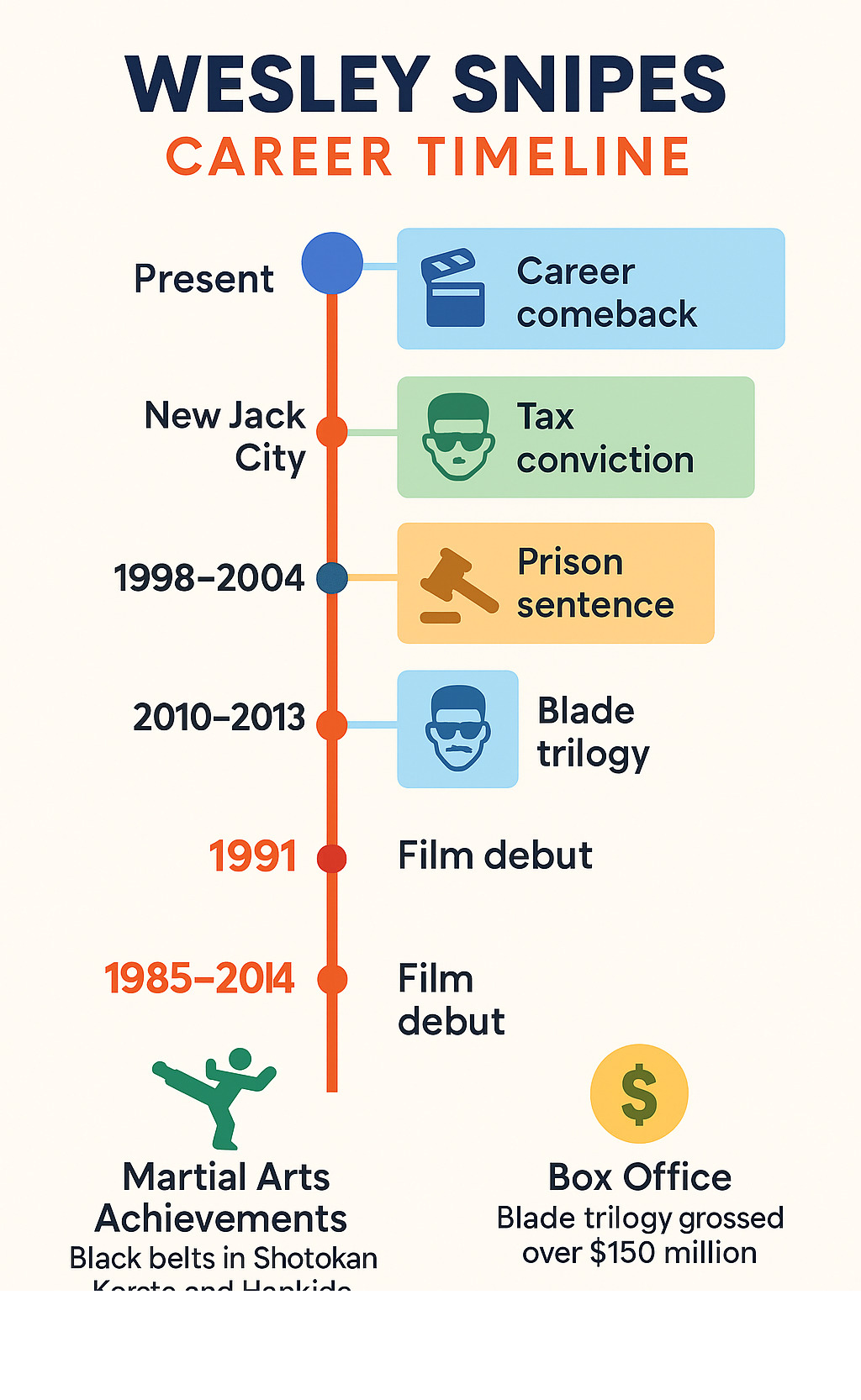Who is Wesley Snipes?
Wesley Snipes is an American actor, martial artist, and producer who became one of Hollywood’s most recognizable action stars in the 1990s and early 2000s. Born on July 31, 1962, in Orlando, Florida, he’s best known for his iconic role as the vampire hunter Blade and his diverse filmography spanning action, drama, and comedy.
Quick Facts About Wesley Snipes:
- Age: 62 years old (born July 31, 1962)
- Height: 5’9″ (1.75 m)
- Martial Arts: 5th-degree black belt in Shotokan Karate, 2nd-degree black belt in Hapkido
- Most Famous Role: Blade in the Blade trilogy (1998-2004)
- Career Span: 1985-present
- Notable Films: New Jack City, White Men Can’t Jump, Demolition Man, Passenger 57
- Personal Life: Married to Nakyung Park (2003-present), 5 children total
- Legal Issues: Served 28 months in prison (2010-2013) for tax-related charges
Snipes started his journey in dance and theater before transitioning to film. His breakthrough came with Spike Lee’s New Jack City in 1991, which launched him into stardom. Beyond his action hero persona, he’s shown remarkable versatility in comedies like White Men Can’t Jump and dramas like The Waterdance.
His real-life martial arts expertise – including black belts in multiple disciplines – brought authenticity to his action roles that set him apart from other actors. The Blade trilogy alone grossed over $150 million worldwide and helped pave the way for modern superhero films.
Despite facing significant legal challenges in the 2000s, including a three-year prison sentence for tax issues, Snipes has successfully rebuilt his career with recent appearances in The Expendables 3, Dolemite Is My Name, and Coming 2 America.

Wesley snipes vocab to learn:
The Making of an Icon: Early Life and Career
Every great story starts somewhere, and Wesley Snipes’ journey to stardom began with a passion for performance. Born Wesley Trent Snipes on July 31, 1962, he spent his formative years between Florida and New York City’s South Bronx, where he found his love for dance and theater.
It was in these early years that young Wesley found his true passion – and surprisingly, it wasn’t acting at first. He dreamed of becoming a professional dancer! This love for movement and performance led him to the prestigious High School for the Performing Arts, where future stars come to hone their craft.
Wesley’s dedication to his art was remarkable. He earned a Victor Borge Scholarship that opened doors to SUNY Purchase, where he dove deeper into acting, dance, and musical theatre. But he didn’t stop there – he co-founded a theater company called ‘Struttin Street Stuff’ with friends and teachers, performing street theatre to perfect their skills and connect with real audiences.
His hard work paid off when he made his Broadway debut, catching the eye of an agent who would change his life forever. This led to his first film role in 1986’s Wildcats, where he played a football player alongside Goldie Hawn. It was a small start, but it was the beginning of something big.
The moment that truly launched Wesley Snipes into the spotlight came in 1987 with Michael Jackson’s “Bad” video. Playing Mini Max, a gang leader who challenges the King of Pop himself, Wesley showcased his magnetic screen presence to millions worldwide. Fun fact: he once joked that he “stole” this role from Prince, who was also being considered!
The late 1980s brought a game-changing partnership with director Spike Lee. Their collaborations in films like Mo’ Better Blues and Jungle Fever proved Wesley’s dramatic range and ability to portray complex characters. Interestingly, he actually turned down a smaller role in Lee’s Do the Right Thing to take a bigger part in the baseball comedy Major League – a strategic choice that showed his early business savvy.
But it was 1991’s gritty crime drama New Jack City that truly made Wesley a household name. Playing the ruthless drug lord Nino Brown, he captivated audiences with his intensity and charisma. The film was a massive hit, earning nearly $50 million on just an $8 million budget, proving that Wesley Snipes was box office gold.
Like many success stories, Wesley’s path had its share of missed opportunities. A family move during his youth meant he missed out on potentially appearing in Fame and a Broadway production of The Me Nobody Knows. But as fate would have it, these setbacks only led him to even greater achievements.
From a young dancer to a rising Hollywood star, Wesley Snipes had laid the foundation for what would become one of the most diverse and fascinating careers in entertainment.
The Action Legacy of Wesley Snipes
When you think of Wesley Snipes, one image immediately comes to mind: a supremely athletic warrior moving with deadly precision, whether he’s taking down hijackers on a plane or slicing through vampires with a silver sword. His action legacy isn’t just about the roles he played—it’s about how he revolutionized what an action hero could be.

Wesley Snipes brought something different to Hollywood’s action scene in the early 1990s. His physical discipline was immediately apparent—this wasn’t an actor who needed a stunt double for every fight scene. When he starred in Passenger 57 (1992), audiences witnessed a new kind of hero: calm, collected, and devastatingly effective. His famous line “Always bet on black” became iconic, but it was his fluid combat moves that really sold the character.
The following year, Demolition Man (1993) showcased his range by casting him as the villain Simon Phoenix. Wesley Snipes didn’t just play evil—he embodied chaotic energy with bleached hair and a maniacal grin, creating one of the most memorable antagonists of the decade. His physical confrontations with Sylvester Stallone crackled with intensity, proving he could dominate the screen whether playing hero or villain.
But it was The Blade Trilogy that truly cemented his place in action movie history. When Blade hit theaters in 1998, it changed everything. This wasn’t just another superhero movie—it was a dark, stylish vampire-hunting masterpiece that proved comic book adaptations could be serious, sophisticated, and incredibly cool.
Wesley Snipes didn’t just act as Blade; he became Blade. His dedication to the role was legendary. He trained relentlessly, perfecting sword work and martial arts techniques that made every fight scene feel authentic. The film grossed over $150 million worldwide and essentially paved the way for the modern superhero movie boom we see today.
What made the Blade trilogy so special wasn’t just the leather coat and sunglasses—it was how Wesley Snipes brought real martial arts mastery to a fantasy character. Every kick, every sword strike, every acrobatic move was grounded in genuine skill and years of training.
The Martial Arts Mastery of Wesley Snipes
Here’s what most people don’t realize about Wesley Snipes: his martial arts credentials are absolutely legitimate. While many action stars learn choreography for their roles, Snipes has been a serious martial artist since he was 12 years old. This isn’t Hollywood make-believe—it’s the real deal.
His impressive credentials speak for themselves. Wesley Snipes holds a 5th dan black belt in Shotokan Karate and a 2nd dan black belt in Hapkido. But his training doesn’t stop there. He’s also skilled in Capoeira, Kung Fu, Brazilian Jiu Jitsu, and Kickboxing. This diverse background allowed him to create fight scenes that felt fresh and authentic.
Watch any of his action films, and you’ll see the difference immediately. His movements have a precision and flow that can’t be faked. Whether he’s executing the powerful linear strikes of Shotokan or incorporating the fluid, dance-like movements of Capoeira, every technique looks natural and devastating.
This martial arts mastery transformed his on-screen fighting from simple choreography into something approaching art. In the Blade films, you can see elements of different fighting styles seamlessly blended together. One moment he’s using Hapkido joint locks, the next he’s flowing into Capoeira kicks—all while wielding a sword with deadly accuracy.
The authenticity Wesley Snipes brought to his roles helped lift the entire action genre. Directors knew they could create more complex, demanding fight sequences because they had an actor who could actually perform them. This raised the bar for action cinema and influenced countless films that followed.
For more details on his life and career, you can explore his biography further. More on his biography from Britannica
Beyond the Action Genre: A Showcase of Versatility
While Wesley Snipes is undeniably celebrated for his action hero roles, his true artistry lies in his remarkable ability to transform across genres. Throughout his career, he has consistently surprised audiences by stepping far outside his comfort zone, proving that his talent extends well beyond martial arts and fight sequences.

One of his most beloved performances came in the 1992 basketball comedy White Men Can’t Jump. Playing Sidney Deane, a smooth-talking streetball hustler, Wesley Snipes displayed perfect comedic timing alongside Woody Harrelson. The chemistry between these two actors was electric, creating one of the most memorable buddy comedies of the 1990s.
What makes this performance even more impressive is the timing – Snipes went from playing the ruthless drug lord Nino Brown in New Jack City to this lighthearted role within just one year. It’s a testament to his range that audiences completely bought into both characters. Fun fact: Snipes reportedly helped secure Harrelson’s role by deliberately acting awkwardly during Keanu Reeves’ screen test!
But Wesley Snipes didn’t stop at comedy. His dramatic work has earned him serious critical acclaim and international recognition. In The Waterdance (1992), he delivered a deeply moving performance as a paraplegic writer, earning an Independent Spirit Award nomination. This role required incredible emotional depth and sensitivity – qualities that might surprise those who only know him from action films.
His dramatic talents reached their peak with One Night Stand (1997), where his nuanced performance earned him the Coppa Volpi for Best Actor at the Venice Film Festival. This prestigious international award highlighted his ability to carry complex dramatic narratives with subtlety and power.
Perhaps his most surprising change came in To Wong Foo, Thanks for Everything! Julie Newmar (1995). Wesley Snipes completely reinvented himself as a drag queen, embracing the character with humor, warmth, and genuine dignity. This role demonstrated his fearlessness as an actor and his willingness to challenge traditional expectations of masculinity on screen.
More recently, Wesley Snipes has continued to delight audiences with his versatility. His scene-stealing performance as D’Urville Martin in Dolemite Is My Name (2019) alongside Eddie Murphy earned widespread praise and contributed to the film’s impressive 97% rating on Rotten Tomatoes. He brought that same comedic energy to Coming 2 America (2021), proving his timing remains as sharp as ever.
The Diverse Filmography of Wesley Snipes
The breadth of Wesley Snipes’s career truly showcases an actor who refuses to be pigeonholed. From his early days in Wildcats to his recent comeback performances, he has consistently chosen roles that challenge both himself and audience expectations.
His work in White Men Can’t Jump remains a fan favorite, perfectly balancing wit and athleticism. The crime drama Sugar Hill (1993) allowed him to explore complex moral territory, while To Wong Foo, Thanks for Everything! Julie Newmar broke new ground entirely. His award-winning turn in One Night Stand proved his dramatic chops on an international stage.
Most recently, Dolemite Is My Name reminded everyone why Wesley Snipes is such a treasure. His hilarious portrayal of the temperamental actor-director showed perfect comedic instincts and scene-stealing charisma that had been missed during his legal troubles.
This diverse filmography paints a picture of an actor constantly pushing boundaries and refusing to coast on his action hero success. Whether he’s making us laugh, cry, or cheer, Wesley Snipes brings the same intensity and commitment to every role – proving that true versatility never goes out of style.
Ventures, Challenges, and Comeback
The story of Wesley Snipes extends far beyond the silver screen, encompassing ambitious business ventures, profound personal challenges, and ultimately, one of Hollywood’s most inspiring comeback stories. His journey through the 2000s and 2010s reveals a man who refused to be defined by his setbacks.

Wesley Snipes has always been more than just an actor. In 1991, he founded his own production company, Amen-Ra Films, with a subsidiary called Black Dot Media. This move gave him creative control over projects that aligned with his vision. His entrepreneurial spirit didn’t stop there – he ventured into writing, co-creating the sci-fi comics After Dark and The Exiled, and co-authored the novel Talon of God. He even established a security firm, showcasing his diverse business interests.
But life has a way of testing even the strongest among us. In 2008, Wesley Snipes faced his greatest challenge when he was convicted on three misdemeanor counts of willful failure to file federal income tax returns. The federal government alleged he owed approximately $23.5 million in federal tax liabilities and had made false refund claims of over $11.3 million. He was sentenced to three years in prison, beginning his sentence in December 2010.
The impact on his career was immediate and devastating. Unable to leave the United States, he missed out on international productions. Most notably, Sylvester Stallone had originally chosen him for the role of Hale Caesar in The Expendables, but the part went to Terry Crews instead. Legal battles with New Line Cinema over Blade: Trinity added to his troubles, with reports of on-set difficulties painting a challenging picture of his final superhero outing.
Yet even during this dark period, Wesley Snipes showed remarkable resilience. He served 28 months in prison, was released in April 2013, and completed house arrest by July of the same year. His perspective on the experience was characteristically thoughtful: “I hope I came out a better person.”
The road back wasn’t easy, but Wesley Snipes approached his return to Hollywood with grace and determination. His comeback began with The Expendables 3 in 2014, where he finally joined his action star peers. The irony wasn’t lost on anyone – he was playing a character who had just been released from prison, art mirroring life in the most unexpected way.
Since then, his career resurgence has been nothing short of remarkable. He delivered a scene-stealing performance in Dolemite Is My Name (2019), earning widespread critical acclaim and a 97% rating on Rotten Tomatoes. His appearance in Coming 2 America (2021) proved that his comedic timing remained as sharp as ever.
Wesley Snipes has also faced personal tragedies with remarkable strength. His apartment was destroyed during the 9/11 attacks, though he and his family were fortunately on the West Coast at the time. He’s steered spiritual journeys, including a temporary conversion to Islam in 1978, which he credits with increasing his self-awareness and dignity.
His story teaches us that setbacks don’t define us – how we respond to them does. Wesley Snipes has shown that with resilience, grace, and unwavering determination, it’s possible to rebuild not just a career, but a legacy.
Frequently Asked Questions
When it comes to a figure as dynamic and impactful as Wesley Snipes, it’s natural to have questions. We’ve gathered some of the most common inquiries about his life and career to provide clear, honest answers based on our extensive research.
What martial arts is Wesley Snipes trained in?
Wesley Snipes is genuinely one of Hollywood’s most accomplished martial artists, and his skills aren’t just for show. He began his martial arts journey at the tender age of 12 and has never stopped training, which is pretty impressive when you think about it.
His most notable achievement is his 5th dan black belt in Shotokan Karate, a traditional Japanese martial art known for its powerful, linear techniques and deep stances. That’s no small feat – reaching 5th dan takes years of dedicated practice and mastery. He also holds a 2nd dan black belt in Hapkido, a Korean martial art that’s all about dynamic kicks, joint locks, and throws.
But wait, there’s more! Snipes has also trained in Capoeira (that beautiful Afro-Brazilian martial art that looks like dancing), various styles of Kung Fu, Brazilian Jiu-Jitsu, and Kickboxing. This diverse background is what made his fight scenes so authentic and believable – he wasn’t just memorizing choreography, he was drawing from decades of real training.
This is what truly set him apart from other action stars of his era. When you watch him move in the Blade films, you’re seeing genuine martial arts mastery in action.
Why was Wesley Snipes convicted of tax crimes?
This is probably the most difficult chapter in Wesley Snipes’ story, and it’s one that significantly impacted his career and personal life. In 2008, he was convicted on three misdemeanor counts of willful failure to file federal income tax returns.
The situation was quite serious. The federal government claimed he owed approximately $23.5 million in federal tax liabilities for tax year 2001 and the years 2003 through 2006. On top of that, he was accused of making false claims for tax refunds totaling over $11.3 million.
Wesley Snipes maintained his innocence throughout the process, arguing that he was misled by tax advisors. However, despite his appeals, he was sentenced to three years in federal prison. He began serving his sentence on December 9, 2010, and was released on April 2, 2013, after serving approximately 28 months. He then completed a period of house arrest.
This conviction had a profound impact on his career. He couldn’t travel internationally for film projects, which meant missing out on roles – including Sylvester Stallone’s original choice for him in The Expendables. It’s a reminder that even Hollywood stars aren’t immune to serious legal consequences.
What is Wesley Snipes doing now?
The great news is that Wesley Snipes has made a remarkable comeback and remains active in Hollywood. Following his release from prison, he approached his return with grace and determination, famously saying, “I hope I came out a better person.”
His career resurgence began with The Expendables 3 in 2014, where he finally got to work alongside his action star peers. Since then, he’s been steadily rebuilding his filmography with some truly memorable performances.
His role in Dolemite Is My Name (2019) alongside Eddie Murphy was a particular standout, earning critical acclaim and reminding everyone of his incredible comedic timing. The film boasted an impressive 97% rating on Rotten Tomatoes, and Snipes was a big part of that success. He also brought his unique flair to Coming 2 America (2021), proving his comedic chops are as sharp as ever.
While he may not be headlining major blockbusters like he did in the ’90s, Wesley Snipes continues to work steadily in film and television. He’s also remained active as a producer and continues exploring creative ventures, including his writing projects like the Talon of God novel and The Exiled comic series.
He frequently appears at conventions and industry events, maintaining a strong connection with his fanbase. His legacy as both a martial arts action star and a versatile actor ensures his enduring presence in popular culture, and honestly, it’s wonderful to see him thriving again.
Conclusion: The Enduring Legacy of an Icon
The story of Wesley Snipes reads like a Hollywood screenplay itself – filled with triumph, setbacks, and an incredible comeback that proves the power of resilience. From a young boy practicing martial arts to becoming one of cinema’s most recognizable action heroes, his journey has been nothing short of extraordinary.
Wesley Snipes didn’t just act in action movies; he revolutionized them. His genuine martial arts expertise brought an authenticity to fight scenes that audiences had rarely seen before. When he wielded that sword as Blade, it wasn’t just movie magic – it was decades of disciplined training coming to life on screen. His influence as a pioneering Black action hero opened doors and changed perceptions about who could lead a major franchise.
The Blade trilogy alone proved that superhero films could be dark, complex, and wildly successful. Years before the Marvel Cinematic Universe dominated theaters, Wesley Snipes was showing Hollywood that comic book adaptations could be serious business. His portrayal helped pave the way for the superhero boom we see today.
What makes his legacy even more remarkable is how he weathered life’s storms. The tax conviction and prison sentence could have ended many careers permanently. Instead, Wesley Snipes used that time for reflection and growth. “I hope I came out a better person,” he said, and his graceful return to Hollywood proved exactly that.
His versatility as an actor often gets overshadowed by his action star status, but it shouldn’t. From the comedy gold of White Men Can’t Jump to the dramatic depth of The Waterdance, he consistently showed range that few actors possess. His recent work in Dolemite Is My Name reminded everyone that his talent extends far beyond martial arts.
At Beyond Beauty Lab, we understand that true wellness comes from within. Wesley Snipes embodies this philosophy perfectly. His physical discipline through martial arts, his mental fortitude through personal challenges, and his creative spirit through diverse roles all contribute to a holistic approach to life and success.
His story teaches us that setbacks don’t define us – how we respond to them does. Wesley Snipes remains an inspiration not just for his on-screen heroics, but for his real-life resilience and ability to reinvent himself while staying true to his core values.
The legacy of Wesley Snipes will endure because it represents more than entertainment – it represents the power of dedication, the importance of authenticity, and the strength that comes from never giving up on yourself.







